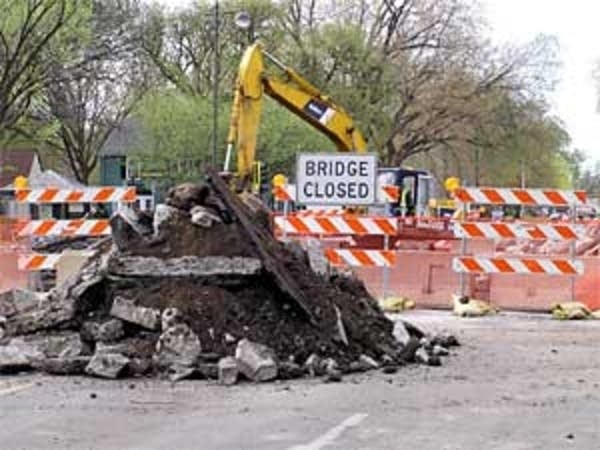Road costs more often being paid by property taxes

Herb Nelson is irked about his property tax increase.
The 77 year-old retired electrician and Minneapolis homeowner lives on a fixed income of social security and some pension and his property taxes went up.
"This last year they went up $259.06. Now the 6 cents I can handle, but the rest of it is a little steep," he says.
The portion of Hennepin County property taxes going to transportation has increased dramatically over the years. This year, officials say, about four percent of the county's property tax levy is going for transportation.
Create a More Connected Minnesota
MPR News is your trusted resource for the news you need. With your support, MPR News brings accessible, courageous journalism and authentic conversation to everyone - free of paywalls and barriers. Your gift makes a difference.

Hennepin County Board Chairman Randy Johnson says the county uses property tax revenue for maintenance but also increasingly for road construction.
"The bigger change has come on what we spend on our capital projects. That's gone from a $500,000 10 years ago to $14.5 million in 2006," Johnson says. "Those are pretty dramatic increases and shifts to the property tax." Minnesota will spend about $3.6 billion this year on all state and local transportation projects. Roughly 1/3 of that, just over $1 billion, will be paid for by local revenue including property taxes.
Lobbyist Margaret Donahoe, who works for the Minnesota Transportation Alliance, thinks many city and county property taxpayers would be surprised and then angry to learn that such a large amount of local revenue is going for projects that many consider a state responsibility
"I think people would be upset. I think they also agree this should be more of a shared responsibility, it shouldn't be just the local property taxpayers for roads that obviously run much farther than just in front of their property," she says.
Why are cities and counties spending more property tax dollars on transportation?
They're trying to pick up the slack for what many say is the state's failure to address a chronic transportation funding problem.
The problem, Margaret Donahoe and other transportation advocates say, is the repair bills for Minnesota's aging road and bridge system are coming due. She says the bills vastly exceed the amount the state is spending to maintain our system.

"If you add up the cost of all those projects and then you look at the amount of revenue MnDOT (Minnesota Department of Transportation) will receive given the current funding situation, they are short $1 billion a year over the next 20 years," she says.
Besides using property taxes, counties are increasingly turning to borrowing to pay transportation bills.
Officials in western Minnesota's Kandiyohi County estimate 10 percent of the county's property tax revenue goes to fund transportation projects. Kandiyohi County commissioner Harlan Madsen says his board has also approved borrowing money for road and bridge projects, but he doesn't like it.
Madsen says the money has to be paid back with interest from future revenue including from property taxes, and that cuts into the county's ability to cover costs for other needs.
He says county property taxpayers would have been tagged for even more money if officials hadn't postponed some work.
"We've dropped two projects already this year to the tune of easily $500,000," he says. "If they would have been added to it and if we would have wanted to supplement local dollars that 10 percent could be 15 percent pretty easily."
I think that voters are going to become upset with the condition of the roads and congestion and they're going to be upset if their property taxes continue to increase significantly.
Minnesota is hardly alone in its transportation funding woes.
All around the country, Brookings Institution transportation analyst Rob Puentes says, huge repair and maintenance bills are coming due.
"(They are) bridges that have long maxed out their maximum capacity having to be rebuilt, interchanges that are spaghetti bowls and the other interchanges that are tangles and messes in other metropolitan areas. Those are having to be rehabilitated," he says.
Along with repair, Puentes says, demand for new roads continues to grow.
"Folks are leaving the center cities and the older suburbs fleeing to the suburban fringe requiring the expenditure of billions and billions dollars of revenue for transportation infrastructure. These trends are accelerating in ways that they haven't in previous decades," he says.
Solutions to Minnesota's transportation funding dilemma abound. But they're expensive and unpopular. Lobbyist Margaret Donahoe says none of them alone solves the problem.
"The problem has just gotten so big because of all the years of neglect," she says. "There's no magic bullet."
Increasing the gasoline tax even a few pennies would raise hundreds of millions of new dollars every year. When Congress last year passed a new federal transportation it considered, then discarded, a plan to raise the federal gas tax when the White House threatened a presidential veto.
Minnesota's gas tax hasn't been raised since l988 when it was set at 20 cents a gallon. Every attempt to increase it since then has failed. Elsewhere, voters in some cities and counties around the country are using local sales taxes to pay for transportation costs.
At this point in Minnesota's legislative session, there's nothing before Minnesota lawmakers that addresses the state's chronic transportation funding dilemma.
Indeed some see rising property taxes as the stick that's needed to prod voters into restoring more local control over tax policy. Rising local taxes the thinking goes will rouse citizens to demand their local officials trim spending.

But Hennepin County board chairman Randy Johnson, a Republican, says taxpayers could take their frustrations out on any number of elected officials who they regard as responsible parties.
"I think that voters are going to become upset with the condition of the roads and congestion and they're going to be upset if their property taxes continue to increase significantly," he says. "But I don't think they're going to take it out on just local officials. I think they're going to look at the governor and the legislature and say, 'Why didn't you act, why weren't you willing to make the tough decisions?'"
This fall Minnesota voters have a rare opportunity to take direct action on transportation funding.
A ballot question asks voters if they want to amend the state constitution to direct all motor vehicle excise sales tax revenue to transportation. Currently about half goes to the general fund. Voter approval could eventually mean as much as half a billion dollars more for road, bridge and transit spending. It's a large amount of money but still far short of what advocates say is needed to maintain and expand Minnesota's transportation system.
